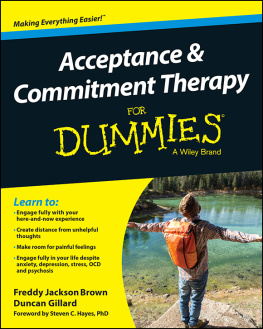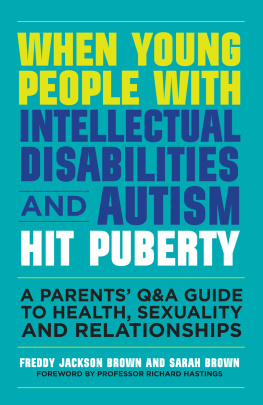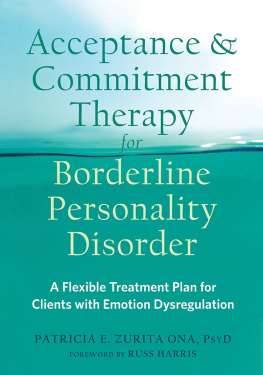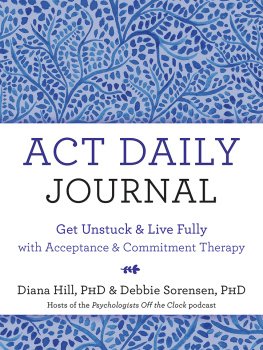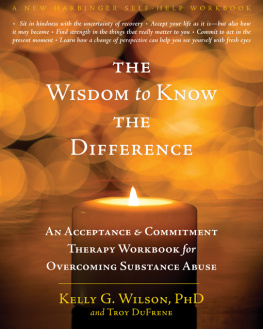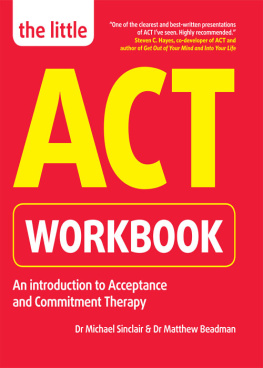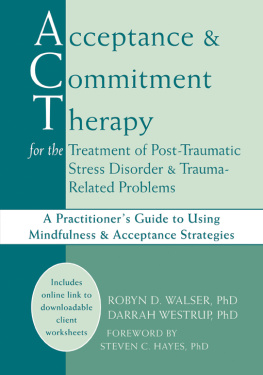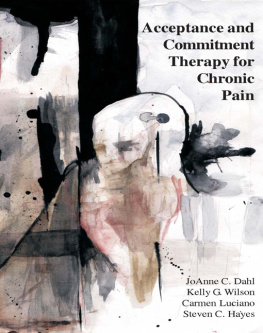
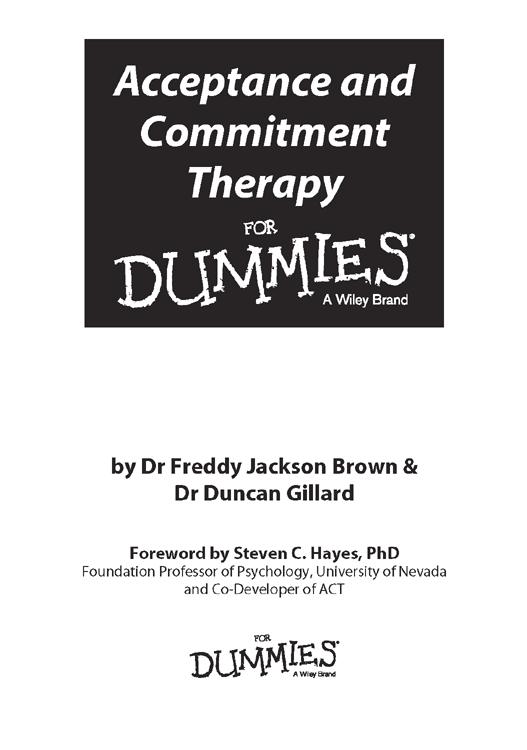
Acceptance and Commitment Therapy For Dummies
Published by: John Wiley & Sons, Ltd., The Atrium, Southern Gate, Chichester,www.wiley.com
This edition first published 2016
2016 by John Wiley & Sons, Ltd., Chichester, West Sussex
Registered Office
John Wiley & Sons, Ltd., The Atrium, Southern Gate, Chichester, West Sussex, PO19 8SQ, United Kingdom
For details of our global editorial offices, for customer services and for information about how to apply for permission to reuse the copyright material in this book, please see our website at www.wiley.com .
All rights reserved. No part of this publication may be reproduced, stored in a retrieval system or transmitted in any form or by any means, electronic, mechanical, photocopying, recording, scanning or otherwise, except as permitted by the UK Copyright, Designs and Patents Act 1988, without the permission of this publisher.
Designations used by companies to distinguish their products are often claimed as trademarks. All brand names and product names used in this book are trade names, service marks, trademarks or registered trademarks of their respective owners. The publisher is not associated with any product or vendor mentioned in this book.
LIMIT OF LIABILITY/DISCLAIMER OF WARRANTY: THE CONTENTS OF THIS WORK ARE INTENDED TO FURTHER GENERAL SCIENTIFIC RESEARCH, UNDERSTANDING, AND DISCUSSION ONLY AND ARE NOT INTENDED AND SHOULD NOT BE RELIED UPON AS RECOMMENDING OR PROMOTING A SPECIFIC METHOD, DIAGNOSIS, OR TREATMENT BY PHYSICIANS FOR ANY PARTICULAR PATIENT. THE PUBLISHER AND THE AUTHOR MAKE NO REPRESENTATIONS OR WARRANTIES WITH RESPECT TO THE ACCURACY OR COMPLETENESS OF THE CONTENTS OF THIS WORK AND SPECIFICALLY DISCLAIM ALL WARRANTIES, INCLUDING WITHOUT LIMITATION ANY IMPLIED WARRANTIES OF FITNESS FOR A PARTICULAR PURPOSE. IN VIEW OF ONGOING RESEARCH, EQUIPMENT MODIFICATIONS, CHANGES IN GOVERNMENTAL REGULATIONS, AND THE CONSTANT FLOW OF INFORMATION, THE READER IS URGED TO REVIEW AND EVALUATE THE INFORMATION PROVIDED IN THE PACKAGE INSERT OR INSTRUCTIONS FOR EACH MEDICINE, EQUIPMENT, OR DEVICE FOR, AMONG OTHER THINGS, ANY CHANGES IN THE INSTRUCTIONS OR INDICATION OF USAGE AND FOR ADDED WARNINGS AND PRECAUTIONS. READERS SHOULD CONSULT WITH A SPECIALIST WHERE APPROPRIATE. NEITHER THE PUBLISHER NOR THE AUTHOR SHALL BE LIABLE FOR ANY DAMAGES ARISING HEREFROM.
For general information on our other products and services, please contact our Customer Care Department within the U.S. at 877-762-2974, outside the U.S. at 317-572-3993, or fax 317-572-4002. For technical support, please visit www.wiley.com/techsupport .
Wiley publishes in a variety of print and electronic formats and by print-on-demand. Some material included with standard print versions of this book may not be included in e-books or in print-on-demand. If this book refers to media such as a CD or DVD that is not included in the version you purchased, you may download this material at http://booksupport.wiley.com . For more information about Wiley products, visit www.wiley.com .
A catalogue record for this book is available from the British Library.
Library of Congress Control Number: 2015960021
ISBN 978-1-119-10628-9 (pbk); ISBN 978-1-119- 10629-6 (ebk); ISBN 978-1-119- 10630-2 (ebk)
Acceptance and Commitment Therapy For Dummies
Visit www.dummies.com/cheatsheet/acceptanceandcommitmenttherapy to view this book's cheat sheet.
- Table of Contents
Guide
Pages
Foreword
Successful businesses across the world apply this simple principle: focus more on the few things that do a lot, rather than the many things that do a little.
This is such a book.
If you look at the table of contents for this book you will see that after a handful or two of short chapters it bangs through a pretty incredible list of important topics: love, anxiety, depression, anger, pain, addiction, work and even psychosis. And every one of those later chapters shows how psychological flexibility applies.
Is that even possible?
It turns out that it is. ACT is about the few core things in psychology that make an important difference in lots and lots of different areas. Last time I counted there were over 125 controlled studies (and hundreds more of lesser kinds) showing that the small set of skills that ACT targets makes a difference virtually everywhere that human minds go.
This is an ACT For Dummies book, but you could also call it an ACT for When You Are Too Smart for You Own Good book. Minds do not know when to stop! They are figuring it all out even when what they need to do is just be quiet and let people learn new ways of being and doing. There is a conflict between how your analytical mind works and how learning by direct experience works. Our analytical minds are great for doing taxes but they are awful at getting over past hurts. Your minds are great in the role of a tool and lousy when put in the role of being the boss or dictator. What ACT does is to teach you how to put your mind on a leash so you can use it when you want rather than it using you when it wants.
This book will help. There is nothing dumb about that!
Steven C Hayes, PhD
Foundation Professor of Psychology, University of Nevada
Co-developer of ACT
Introduction
Acceptance and Commitment Therapy (said as one word, ACT) is an evidence-based psychological intervention that uses acceptance and mindfulness techniques alongside behaviour change strategies to help you live life according to what really matters to you. Based on recent breakthroughs in understanding how language works, ACT offers a genuinely original perspective on the human condition and the challenge everyone faces in living a life with meaning and purpose.
ACT is all about doing the things that really matter to you and not letting your mind get in the way. Often, without you realising it, your mind what goes on in your head can push you around and interfere with your daily life. Youre so connected with your thoughts that you dont always notice what they do and, importantly, what they stop you doing. But your mind is really just a tool and, like all tools, is good at solving certain problems and pretty hopeless at addressing others. ACT shows you how to use your mind for what its good at and then to set it aside when your thoughts are less helpful.
To help you get on with the life you want to be living, ACT uses a range of exercises to enable you to become more open, aware and active:
- Openness involves stepping forward into life and accepting all that comes with it.
- Awareness means increasing your connection with the world around you rather than living in your head.
- Being active is about doing the things that truly matter to you.
This is an exciting time for ACT. Every month, new research articles and books explore how it can be applied in different settings and to a host of human problems. In fact, so many new applications are being developed that theres insufficient space in this book to cover them all. Rather, we provide a general introduction to ACT with the aim of helping you understand the central principles, ideas and practices that underpin the model. Contrary to popular belief, doing the things that really matter to you can be quite difficult. And the reason for that, according to ACT, is human language. While language enables you to do amazing things, it also allows you to ruminate on the past and worry about the future. And when you become overly entangled in your thoughts you stop living the life you want to be living and instead your life is dictated by your anger, fears, worries and doubts. This insight isnt particularly new, but where ACT differs to other approaches is in how it responds to these events. Rather than tackling this negativity head on, ACT shows you new ways to relate to your thoughts, feelings and emotions so that they have less impact on your day-to-day life.
Next page
